Digital health
Digital health is the convergence of digital technologies with health, healthcare, living, and society to enhance the efficiency of healthcare delivery and make medicines more personalized and precise.[1] The discipline involves the use of information and communication technologies to help address the health problems and challenges faced by patients.[1] These technologies include both hardware and software solutions and services, including telemedicine, web-based analysis, email, mobile phones and applications, text messages, wearable devices, and clinic or remote monitoring sensors.[2][3] Generally, digital health is concerned about the development of interconnected health systems to improve the use of computational technologies, smart devices, computational analysis techniques and communication media to aid healthcare professionals and patients manage illnesses and health risks, as well as promote health and wellbeing.[1][3]
Digital health is a multi-disciplinary domain which involves many stakeholders, including clinicians, researchers and scientists with a wide range of expertise in healthcare, engineering, social sciences, public health, health economics and management.[2]
Elements
As an outgrowth of the Digital Revolution characterized by "the mass production and widespread use of digital logic circuits, and its derived technologies, including the computer, digital cellular phone, and the Internet,"[4] key elements of digital health include wireless devices, hardware sensors and software sensing technologies, microprocessors and integrated circuits, the Internet, social networking, mobile/cellular networks and body area networks, health information technology, genomics, and personal genetic information.[1][3][5]

Domains
Various domains span digital health.[1][2] These include Healthcare technology assessment and monitoring to prevent, diagnose or treat diseases, monitoring of patients, or for rehabilitation or long-term care. Such technologies include Assistive technologies and rehabilitation robotics for people with disabilities so as to aid in their independence to perform daily tasks, unobtrusive monitoring sensors and wearable devices. Clinical decision support aids clinicians at the point of care, including diagnosis, analysis and interpretation of patient-related data.Computational simulations, modeling and machine learning approaches can model health-related outcomes. E-health delivers health information and services to enable data transmition, storage and retrievial for clinical, educational and administrative purposes. Mobile health (or mhealth) is the practice of medicine and public health supported by mobile devices. Health systems engineering applications in health care systems, includes knowledge discovery, decision making, optimization, human factors engineering, quality engineering, and information technology and communication. Human-computer-environment interactions Human-computer interaction principles tend to be based around user-centered, experience-centered or activity-centered designs. Virtual reality, video gaming rehabilitation, and serious games to provide a social and interactive experience for healthcare student and patient education. Speech and hearing systems for natural language processing, speech recognition techniques, and medical devices can aid in speech and hearing (e.g. cochlear implants).Telehealth, telemedicine, telecare, telecoaching and telerehabilitation provide various forms of patient care remotely at a distance.
Implementation
National digital programs exist to support healthcare, such as those of Canada Health Infoway built on core systems of patient and provider registries, clinical and diagnostic imaging systems, clinical reports and immunizations.[6] By 2014, 75% of Canadian physicians were using electronic medical records.[7]
In Uganda and Mozambique, partnerships between patients with cell phones, local and regional governments, technologists, non-governmental organizations, academia, and industry have enabled mHealth solutions.[8]
Innovation cycle
The innovation process for digital health is an iterative cycle for technological solutions classified into five main activity processes beginning from the identification of the healthcare problem, research, digital solution, evaluating the solution to implementation in working clinical practices.[1][2]
References
_work.png)
- 1 2 3 4 5 6 Bhavnani, Sanjeev P.; Narula, Jagat; Sengupta, Partho P. (7 May 2016). "Mobile technology and the digitization of healthcare". European Heart Journal. 37 (18): 1428–38. doi:10.1093/eurheartj/ehv770. PMID 26873093.
- 1 2 3 4 Widmer, R. Jay; Collins, Nerissa M.; Collins, C. Scott; West, Colin P.; Lerman, Lilach O.; Lerman, Amir (April 2015). "Digital Health Interventions for the Prevention of Cardiovascular Disease: A Systematic Review and Meta-Analysis". Mayo Clinic Proceedings. 90 (4): 469–80. doi:10.1016/j.mayocp.2014.12.026. PMC 4551455. PMID 25841251.
- 1 2 3 "Digital health". Food and Drug Administration. US Department of Health and Human Services. 30 August 2016. Archived from the original on 12 November 2016.
- ↑ Rafael, Perez-Uribe; Carlos, Salcedo-Perez; David, Ocampo-Guzman (2018-04-13). Handbook of Research on Intrapreneurship and Organizational Sustainability in SMEs. IGI Global. ISBN 9781522535447.
- ↑ Topol, Eric J. (2012). The Creative Destruction of Medicine: How the Digital Revolution Will Create Better Health Care. Basic Books. ISBN 978-0-465-02550-3. OCLC 868260493 – via Google Books.
- ↑ "Progress in Canada". Canada Health Infoway. 2016. Archived from the original on 12 November 2016. Retrieved 11 November 2016.
- ↑ Collier, Roger (6 January 2015). "National Physician Survey: EMR use at 75%". Canadian Medical Association Journal. 187 (1): E17–8. doi:10.1503/cmaj.109-4957. PMC 4284187. PMID 25487665.
- ↑ Källander, Karin; Tibenderana, James K.; Akpogheneta, Onome J.; Strachan, Daniel L.; Hill, Zelee; ten Asbroek, Augustinus H.A.; Conteh, Lesong; Kirkwood, Betty R.; Meek, Sylvia R. (25 January 2013). "Mobile health (mHealth) approaches and lessons for increased performance and retention of community health workers in low- and middle-income countries: A review". Journal of Medical Internet Research. 15 (1): e17. doi:10.2196/jmir.2130. PMC 3636306. PMID 23353680.

External links
- "Institute of Digital Healthcare". University of Warwick.